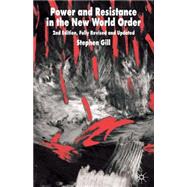
What is included with this book?
| Acknowledgements | p. x |
| Preface to the First Edition | p. xiv |
| Preface to the Second Edition | p. xix |
| Reading Gramsci | p. xx |
| The universal contradiction | p. xxiii |
| A Word on the Structure of the Book | p. xxvi |
| Personal, Political and Intellectual Influences | p. 1 |
| Politics in the classroom and the politics of class | p. 2 |
| A sociological perspective on world order | p. 5 |
| Disciplinary neo-liberalism and the end of history | p. 8 |
| Social and International Theory | p. 11 |
| Epistemology, Ontology and the Critique of Political Economy | p. 15 |
| Epistemology and politics | p. 15 |
| Differences between Gramscian and positivist approaches | p. 17 |
| The critique of political economy: four arguments | p. 20 |
| Beyond vulgar Marxism and the orthodox discourses | p. 38 |
| Transnational Historical Materialism and World Order | p. 42 |
| The limits of the possible | p. 43 |
| The emergence of modern world orders | p. 47 |
| Twentieth-century world order: between hegemony and passive revolution | p. 58 |
| Twenty-first century world order: dialectic between the old and radically new | p. 64 |
| Hegemony, Culture and Imperialism | p. 67 |
| Cultural resistance after the Chilean coup, 1973 | p. 68 |
| The Chilean question and global politics | p. 70 |
| The Political Economy of World Order | p. 73 |
| US Hegemony in the 1980s: Limits and Prospects | p. 80 |
| Theories of hegemonic decline and the conventional wisdom | p. 81 |
| A critique of the conventional wisdom | p. 85 |
| Decline or continuity? | p. 89 |
| US hegemony and transnational capitalism | p. 91 |
| Towards a more liberal and transnational hegemony | p. 96 |
| The Power of Capital: Direct and Structural | p. 100 |
| Historic blocs and social structures of accumulation | p. 100 |
| States, markets and the power of capital | p. 103 |
| The direct power of capital | p. 107 |
| The structural power of capital | p. 109 |
| The power of capital: limits and contradictions | p. 116 |
| Globalization, Market Civilization and Disciplinary Neo-Liberalism | p. 123 |
| Introduction | p. 124 |
| Analyzing power and knowledge in the global political economy | p. 127 |
| The meaning of 'globalization' | p. 130 |
| 'Disciplinary' neo-liberalism | p. 137 |
| New constitutionalism and global governance | p. 138 |
| Panopticism and the coercive face of the neo-liberal state | p. 142 |
| Neo-liberal contradictions and the movement of history | p. 145 |
| The Geopolitics of the Asian Crisis | p. 150 |
| Crisis, danger and opportunity | p. 151 |
| The 'usual suspects' and the imposition of neo-liberalism | p. 152 |
| Mystification and the East Asian model | p. 154 |
| The restructuring of East Asia and the new geopolitics of capital | p. 155 |
| Conclusion | p. 159 |
| Law, Justice and New Constitutionalism | p. 161 |
| Introduction | p. 161 |
| Property rights, contracts and the liberal rule of law | p. 163 |
| Dimensions of new constitutionalism | p. 169 |
| Conclusion | p. 175 |
| Global Transformation and Political Agency | p. 177 |
| Globalizing Elites in the Emerging World Order | p. 183 |
| Global disintegration-integration | p. 183 |
| Perspectives, classes and elites | p. 192 |
| Globalizing elites and social stratification | p. 193 |
| Globalism, territorialism and the United States | p. 197 |
| Concluding reflections | p. 203 |
| Surveillance Power in Global Capitalism | p. 206 |
| Panoptic power | p. 208 |
| American informational capitalism and world power | p. 213 |
| Expanded reproduction of capital and social order | p. 216 |
| Production and social reproduction | p. 221 |
| US social order/disorder: enclavisation and incarceration | p. 223 |
| Homeland security | p. 225 |
| 'Future image architecture': monitoring enemies and friends | p. 227 |
| Conclusion | p. 232 |
| The Post-modern Prince | p. 237 |
| Why the WTO talks failed? | p. 238 |
| The contradictions of neo-liberal globalization and the Seattle protests | p. 240 |
| Towards a post-modern Prince? | p. 244 |
| Alternatives, Real and Imagined | p. 249 |
| Alternative concepts of global leadership | p. 250 |
| Global relations of force and changing conditions of existence | p. 253 |
| Global alternatives: dominant, progressive and reactionary | p. 256 |
| Latin America and Brazil: limits and possibilities | p. 261 |
| Imagining the future of the progressive movements: six propositions | p. 265 |
| Bibliography | p. 270 |
| Index | p. 279 |
| Table of Contents provided by Ingram. All Rights Reserved. |
The New copy of this book will include any supplemental materials advertised. Please check the title of the book to determine if it should include any access cards, study guides, lab manuals, CDs, etc.
The Used, Rental and eBook copies of this book are not guaranteed to include any supplemental materials. Typically, only the book itself is included. This is true even if the title states it includes any access cards, study guides, lab manuals, CDs, etc.